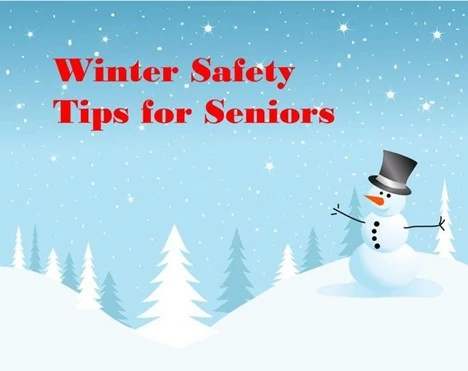
Fall has officially come to Ohio! The Buckeyes are back! The leaves are beautiful! Halloween costumes are coming out and we’re looking forward to the holidays! However, the season changing can be dangerous to seniors.
As we age, our body becomes more sensitive to temperature changes, our balance becomes less steady, our bones become more brittle and our immune system weakens. So, it’s critical for senior adults to take some extra precautions during winter months.
6 Ways to stay safe this winter:
1. Stay warm
- While you may be tempted keep the heat turned down to save on utility bills, seniors should keep their environments between 68-78 degrees Fahrenheit. Too low can cause core body temperature to decline which could lead to hypothermia. Too high can lead to dehydration.
- Dress in layers
- BE CAREFUL WITH SPACE HEATERS! Seniors are three times as likely to have space heater fires. Keep the heater at least 3 feet from any flammable objects.
- If using a fireplace, be sure to have the chimney checked annually and install a carbon monoxide detector.
2. Prepare for emergencies
- Icy roads can be a hazard for everyone. The risks are even higher for seniors. When possible, stay home to avoid the risks. If you can’t stay home, arrange for a driver. Make sure the vehicle has winter tires, at least ½ tank of gas and emergency kit (remember extra blankets) just in case.
- Keep extra food and medications on hand in case you can’t make to the grocery store for a week or longer.
- Power outages are also very common. Be sure to have flashlights or battery powered lanterns available. Also, create a contingency plan just in case the power is out for an extended period.
3. Avoid falls
- Icy sidewalks, driveways and decks can lead to life changing falls. Have someone properly maintain these areas so they are ice and snow free.
- Wear non-skid shoes (Fashion takes a backseat to safety.)
- Remember, just because you took precautions does not mean others will keep their walkways safe. Be cautious when exiting vehicles or buildings.
4. Remember vitamin D
- Cold and cloudy weather mean most of us won’t get the sunshine we need to maintain vitamin D levels. In addition, seniors tend to eat less, which means they won’t get us much Vitamin D from their diet. Lower vitamin D levels lead to lower calcium, which creates more brittle bones. Short version, don’t skip the vitamin D.
5. Get your flu shot
- Seniors are always at a higher risk of developing seasonal flu. It is estimated that up to 85% of flu-related deaths happen in people age 65 and above. According to the CDC, the only way to ensure safety against seasonal flu is to get vaccinated with the flu vaccine every year. The vaccine should be taken by October month before the winter. The virus changes every year, and flu vaccines are updated to match them, so you must take the shot every year.
6. Stay social
- Gloomy weather, bad roads and cold days may diminish social interactions. Decreased socialization can lead to depression. Family and friends should make an extra effort to visit the seniors they love. If in person visits are not possible, a simple phone call can help.
- Professional caregivers (shameless plug for Senior Helpers) can also provide this much needed companionship.